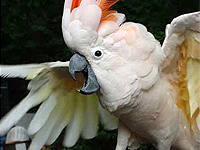|

|
Home
> News & Events > MAARSianChronicles
> Issue 14: February 2006 > Did You Know?:
Top 10 Reasons Birds Are Surrendered to MAARS
Did You Know?
| 
Aggression and loud noise are the fourth
most common reason that birds are surrendered to MAARS.
(Photo by Dee Thompson) |
|
Top 10 Reasons Birds Are Surrendered to MAARS
Each year, millions of exotic birds are sold into the
pet trade in the United States and abroad. Unlike dogs and cats, however,
parrots are not "domesticated" animals, meaning they have
not evolved over many generations through human or natural selection
for traits that make them compatible with a human lifestyle. While their
beauty and intelligence can make them attractive, their natural, wild
behaviors and longevity virtually ensure that an individual bird will
be displaced at least once — if not multiple times — during
his or her lifetime.
Even with the best of intentions, normal parrot behaviors
and human lifestyles are often incompatible over time. The normal landmark
events in people's lives often leave Polly in the lurch. In ascending
order, these are the top ten reasons people surrender their birds to
MAARS:
|
10)
|
Veterinary Bills:
Parrots are expensive to purchase, house, feed, and entertain,
and an expensive health problem is often enough to break the bank.
Behavioral problems such as feather-picking and self-mutilation
can also become expensive, frustrating, and time-consuming to
treat.
|
|
9)
|
Divorce:
The end of a marriage is usually stressful, both emotionally and
financially. In many cases, both parties will move to rented apartments
or to the homes of relatives, which may not allow parrots. The
emotional stress of the situation may make a demanding animal
like a parrot too much to handle.
|
|
8)
|
Death:
Parrots — especially the larger species — can live
50–100 years and can therefore easily outlive their caregivers.
When another family member does not want the bird, MAARS may get
the call. We offer an estate plan for people who wish to provide
for MAARS' care of their birds in their wills.
|
|
7)
|
Too Many Birds:
Because there are so many species and mutations available, some
people find it tempting to "collect" parrots and other
birds. Breeders can also get in over their heads very quickly
when they produce more babies than they can sell, or the birds
they have sold are returned to them for one of the reasons on
this list. Some well-intentioned, but ill-equipped individuals
attempt to take in unwanted birds, but turn into hoarders who
can't care for all of their animals. MAARS takes in birds both
from individuals who surrender them willingly or from situations
where birds are confiscated by law enforcement agencies.
|
|
6)
|
Retirement:
People's lives can change dramatically when they retire, and a
demanding parrot can get in the way of plans to travel, volunteer,
or spend more time with grandchildren.
|
|
5)
|
Illness or Allergies:
The presence of a bird in the home can easily become too much
to bear when a person is suffering from a long-term illness and
doesn't have the energy to provide proper care. When the bird
is actually the cause of the illness, as in the case of allergies
or some other medical conditions, then there is often little else
that can be done short of removing the bird from the home.
|
|
4)
|
Bird is Aggressive
or Loud: Parrots evolved to live in large flocks
and use their voices to communicate with mates, offspring, and
other flock members over great distances. They are also incredibly
intelligent, pair-oriented animals who can become dangerously
aggressive when they feel their mates or territories are being
threatened. As prey animals, they have no other option than to
fight back when they feel cornered and cannot escape — such
as when they are trapped by the inability to fly caused by the
clipping of wing feathers to "tame" the bird. Unfortunately,
most people don't do enough research on the true
nature of parrots before they bring one home and may not be
able to tolerate a bird's natural or stress-induced vocalizations
or behaviors.
|
|
3)
|
Moving:
Moving to a new home can be confusing, frustrating, and tiring,
and many people don't want the added hassle of caring for a demanding
parrot during this time. In addition, many people can't —
or simply won't — limit their rental housing search to buildings
that allow parrots. In these cases, the human family gets a new
home, but the bird is left homeless.
|
|
2)
|
Bird Doesn't
Like a Family Member, or Vice Versa: As an intelligent
animal who is programmed to live in a monogamous, bonded pair
within the structure of an extended flock, a parrot can become
highly possessive of one family member and highly aggressive toward
others that he/she feels may threaten this bond. When a new boyfriend,
girlfriend, spouse, child, elderly parent, roommate, pet, or other
resident moves into a home with a parrot, the bird's behavior
and care demands may become intolerable. In addition, some people
simply do not like living with parrots and many parrot caretakers
will choose to give up the bird for the sake of the human relationship.
|
|
1)
|
New Baby:
The birth or adoption of a new human baby is a highly stressful
time under the best of circumstances. Since caring for a parrot
properly is time-consuming and expensive — the equivalent
of caring for a "special needs" child — it is
often too much stress for a couple or individual to bear when
an even more demanding being enters their lives. If the parrot
also reacts aggressively or self-destructively to the addition
to the family, then it is almost certainly doomed to being displaced. |
|
|